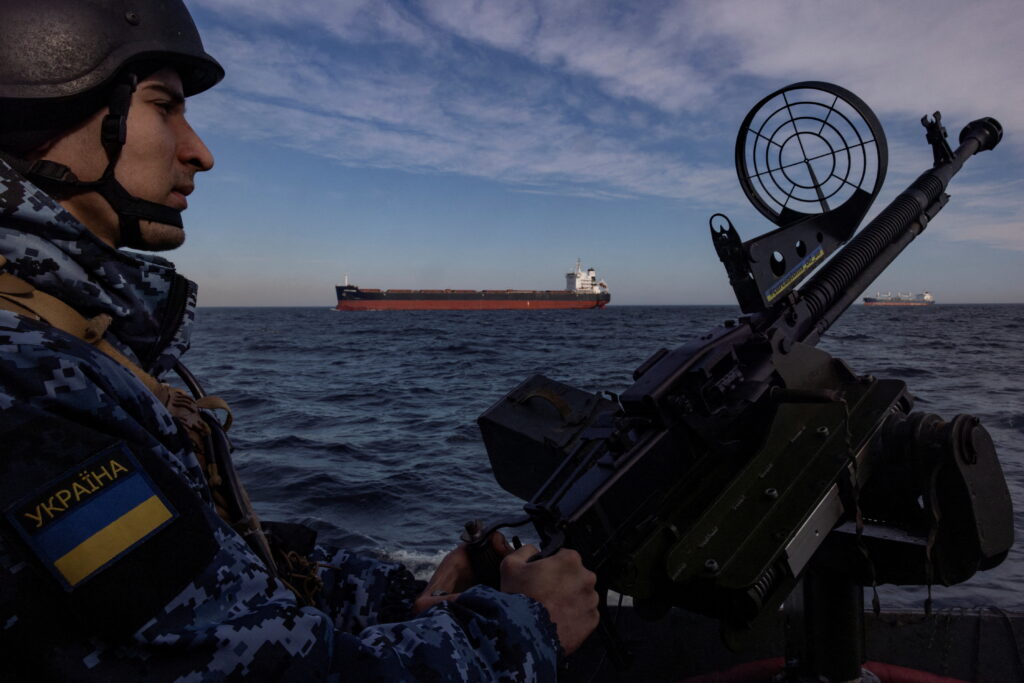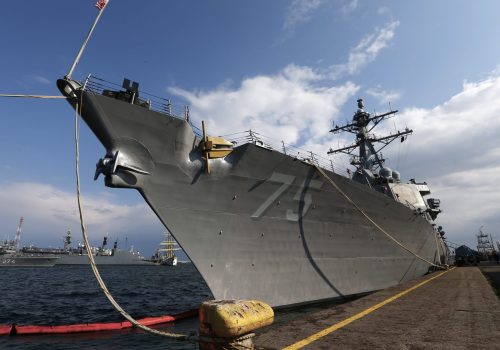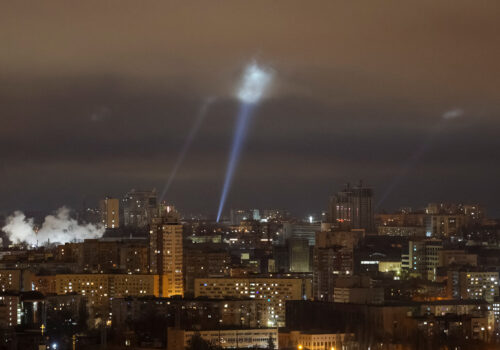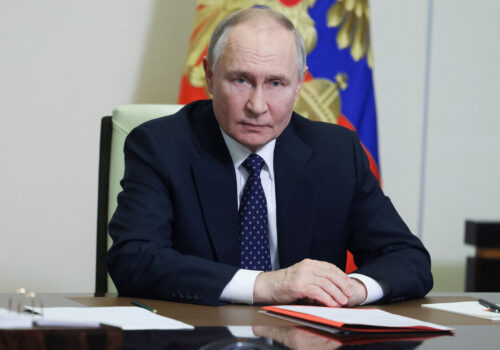A sea change? On Tuesday, the White House announced that Russia and Ukraine have agreed to a cease-fire on the Black Sea and to hammer out the details of a pause on attacking each other’s energy infrastructure. This deal marks the next step in US President Donald Trump’s fast-moving efforts to bring an end to Russia’s war in Ukraine, following his call with Russian President Vladimir Putin on March 18. However, notable differences between the US and Russian readouts of the talks—especially with Russia saying the cease-fire will not begin until certain US sanctions are lifted—may indicate choppy waters ahead. Below, Atlantic Council experts navigate us through what to know about the deal and what’s on the horizon.
Click to jump to an expert analysis:
John Herbst: Coddling Russia only encourages Putin to continue his war
Matthew Kroenig: Trump’s efforts are pushing forward down the road to peace
Kimberly Donovan: To lift sanctions on Russia, the US must not leave its G7 partners out in the cold
Michael Bociurkiw: Ukraine’s coast feels first-hand the threat of Russian missiles and drones
Daniel Fried: The US risks falling down a rabbit hole of concessions to Russia
Maia Nikoladze: Real security on the Black Sea requires addressing Russia’s shadow fleet
Kimberly Talley: Stability in the Black Sea is good for the world, but will this deal deliver it?
Arnold Dupuy: The US has a stronger hand in talks with Russia if it works with its European allies
Coddling Russia only encourages Putin to continue his war
The results from several days of US shuttle diplomacy in Riyadh are in and they are meager. The United States was hoping to nail down an agreement for a cease-fire between Ukraine and Russia at sea. This would be a useful step, but not a major one, because the Black Sea has not seen major kinetic activity for nearly two years as Ukraine won the battle at sea when its naval drones chased the Russian Black Sea Fleet out of Crimea and into the eastern Black Sea. But the Trump administration sought this deal because the Kremlin has made clear that it would not agree to the general cease-fire that Kyiv accepted two weeks ago. Putin’s objective is to string out the negotiations because he wants to conquer more Ukrainian territory.
Unfortunately, the Trump team, in its effort to persuade the Kremlin to accept the naval cease-fire, offered more concessions. These include, according to the White House, US help to “restore Russia’s access to the world market for agricultural and fertilizer exports, lower maritime insurance costs, and enhance access to ports and payment systems for such transactions.” These are major concessions for what should be low-hanging fruit to the aggressor who refused Trump’s proposal for a general cease-fire.
The official Russian statement clearly conditioned the implementation of the cease-fire on the lifting of multiple sanctions. The problem is that major sanctions relief would be a shot in the arm for the stumbling Russian economy—making it easier for Putin to continue the land war he refuses to end. I think Trump still wants an early cease-fire to establish a durable peace. To do that, he needs to change tactics and do what he promised in the first week of his new term: bring the hammer down on the Kremlin.
—John E. Herbst is the senior director of the Atlantic Council’s Eurasia Center and a former US ambassador to Ukraine.
Trump’s efforts are pushing forward down the road to peace
Many question Trump’s tactics, but there is no denying the results. Europe was more peaceful and secure during Trump’s first term than before and after. The Trump administration is now working hard to bring the largest war in Europe since World War II to a close. Many foreign policy experts say they would be doing it differently, but the proof is in the pudding. If the war in Ukraine can be wound down in the coming months—a possible if not likely outcome—this will be a major foreign policy achievement. In that context, today’s announcement is a step toward circumscribing the conflict on the road to eventual peace.
—Matthew Kroenig is vice president and senior director of the Atlantic Council’s Scowcroft Center for Strategy and Security.
To lift sanctions on Russia, the US must not leave its G7 partners out in the cold
There is a critical distinction between the US and Russian versions of the “Outcomes of the US and Russia Experts Groups on the Black Sea.” Notably, the Russian version outlines that Moscow’s adherence to the terms is contingent on lifting sanctions on certain financial institutions, re-connecting those institutions to the Society for Worldwide Interbank Financial Telecommunication (SWIFT) messaging service and opening correspondent accounts, and removing restrictions on trade finance, among other requirements. These contingencies are not included in the statement released by the White House.
Clearly, lifting sanctions was discussed in the meetings in Riyadh. However, lifting sanctions on Russian financial institutions and reconnecting Russian banks to SWIFT is not that easy and will require the agreement of foreign partners. The European Union (EU), the United Kingdom, Japan, Canada, Switzerland, Australia, and others in the Group of Seven (G7) sanctioning coalition maintain sanctions on Russian banks. This includes Rosselkhozbank (Russian Agricultural Bank), which is one of the banks Russia demands sanctions be removed from as part of the agreement. If the United States unilaterally lifts sanctions on Russian financial institutions, then it will create massive compliance challenges for the global financial system and US banks that operate around the world. Further, SWIFT disconnected a select number of Russian banks because they were designated by the EU. SWIFT is headquartered in Belgium, within the EU’s jurisdiction, and it has to follow EU law and sanctions compliance measures.
If the terms that were agreed to are dependent on the lifting of sanctions, the United States needs to coordinate with its G7 coalition partners and seek their agreement on the collective way forward.
—Kimberly Donovan is the director of the Economic Statecraft Initiative at the Atlantic Council’s GeoEconomics Center. She previously served in the federal government for fifteen years, most recently as the acting associate director of the Treasury Department Financial Crimes Enforcement Network’s Intelligence Division.
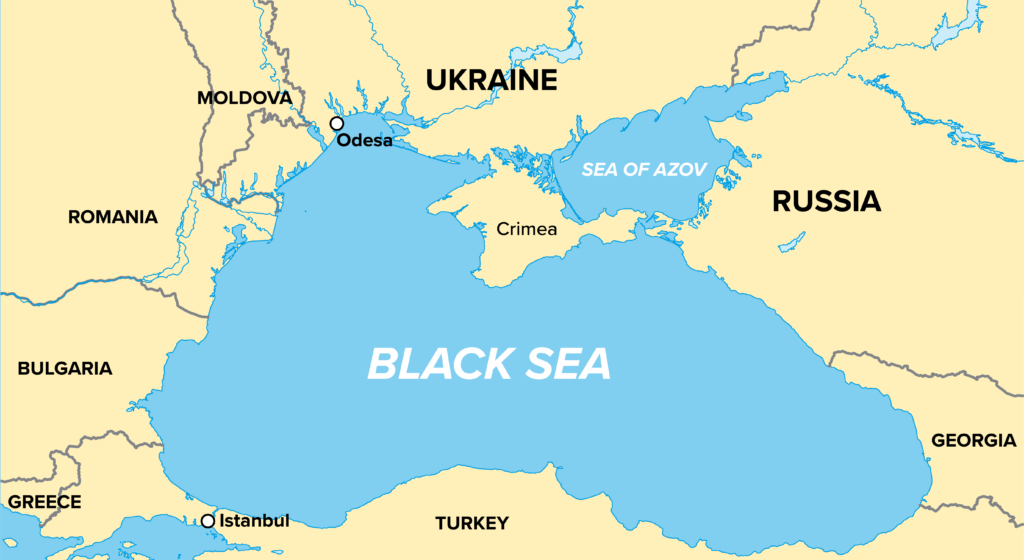
Ukraine’s coast feels first-hand the threat of Russian missiles and drones
ODESA—The devil is in the details of the deal. Now it appears that, in true Russian style, harsh preconditions have been demanded before the Black Sea “deal” can be implemented—the most important of which for Moscow is to reconnect the state-owned Russian Agricultural Bank to SWIFT and for the free flow of Russian fertilizer and agricultural products to world markets.
An Odesa port worker is sitting in front of me as I write this. As he explained, an important aim for Ukraine is to lift the threat of Russian missile and drone attacks on foreign-flagged vessels and local port infrastructure. At least three ships have been hit in recent weeks—most recently a Barbados-flagged bulk carrier was struck, resulting in the death of four foreign seafarers. He showed me photos of significant damage to port cranes.
On the back of that conversation, there’s also a need for Ukraine’s closest partners—namely Poland and Turkey—to give the war-torn country a break. Turkey should allow direct passage of commercial ships from Ukraine without trying to fleece operators from their voyages. And Poland, supposedly a best friend of Ukraine but one of the largest European purchasers of Russian fertilizer, should aim to diversify its sources to avoid funding the Russian war machine.
—Michael Bociurkiw is a nonresident senior fellow at the Atlantic Council’s Eurasia Center.
The US risks falling down a rabbit hole of concessions to Russia
The parallel talks in Riyadh between the United States and Russia on one hand, and the United States and Ukraine on the other, produced little of use to Ukraine but something of use to Russia: agreement that the United States will lift restrictions on Russian agricultural exports, including by lifting certain sanctions. Russia’s statement on the talks makes clear that US action to lift certain sanctions is a precondition for the Black Sea cease-fire that the United States has touted as an achievement.
It is not clear how much the US concessions that Russia seems to have obtained will mean in practice. Sanctions on Russian agricultural exports have not been a US priority, for good reason. But the one-sided advantage to Russia does little to advance the thirty-day comprehensive cease-fire the Trump administration had sought. Instead, Russia appears to be stalling, blunting the former US threats of pressure on Russia to stop the fighting. The United States risks being sucked down a rabbit hole of concessions, easing pressure on Russia while Russian forces continue to attack Ukrainian cities and civilians. Today’s deal is no peace through strength.
—Daniel Fried is the Weiser Family distinguished fellow at the Atlantic Council and a former US ambassador to Poland.
Real security on the Black Sea requires addressing Russia’s shadow fleet
As the United States continues to engage with Russia on energy and maritime agreements, the future of Russia’s shadow fleet should be a key aspect of negotiations. Russia’s shadow fleet, which includes about 1,300 aging and poorly maintained vessels, was responsible for the shipping of 78 percent of Russia’s seaborne crude oil in 2024. Apart from facilitating Russia’s sanctions evasion, the shadow fleet poses a grave environmental danger to the Black Sea and international waters, and it is disrupting the global maritime and shipping industry.
In December 2024, two Russian oil tankers collided off the coast of Russia-annexed Crimea, spilling more than nine thousand tons of heavy toxic fuel oil and leading to a state of emergency in Crimea. The shipping industry raised concerns about the risk of collisions with Russia’s shadow fleet tankers in open sea lanes. Some European authorities have moved on to confiscating Russia’s shadow fleet vessels floating near their coastlines. On March 21, Germany confiscated the oil tanker Eventin along with some $43.3 million worth of oil on it. While Moscow denied connection with the tanker, it is believed to be a part of Russia’s shadow fleet.
As the United States engages with Russia over a cease-fire and peace deal, it should also support its allies’ efforts in countering Russia’s shadow fleet. As part of this effort, the United States should support Canada’s proposal in the G7 to create an international task force to tackle Russia’s shadow fleet.
—Maia Nikoladze is an associate director within the GeoEconomics Center.
Stability in the Black Sea is good for the world, but will this deal deliver it?
A Black Sea deal is, in theory, for the global good. Instability in the Black Sea region threatens the security of every Black Sea littoral state and the Euro-Atlantic region more broadly, with shockwaves reverberating across issues such as food security, economic stability, and the energy sector. As a maritime conduit, the Black Sea transported up to 90 percent of Ukraine’s pre-war agricultural exports to Europe, Asia, and Africa. And while the Turkey-brokered Black Sea Grain Initiative was in effect between July 2022 and July 2023, 65 percent of wheat exports targeted developing countries. The Turkish Straits, connecting the Black Sea with the Mediterranean Sea, are a major chokepoint for world oil. Black Sea ports are one of the primary export routes for crude oil and oil products from Russia, Azerbaijan, and Kazakhstan. As such, the Black Sea region represents a critical geostrategic crossroads between Europe, Eurasia, and the Middle East.
However, not every deal will stand the test of time, and longevity is of critical concern for this one. A critical difference between the two sides comes in clause 2 of the Kremlin’s statement, which directly calls for sanctions relief via the restoration of Russia’s access to the world market—an assertion notably absent from the statement from the White House. Further, while Ukrainian President Volodymyr Zelenskyy said on Tuesday that Ukraine had agreed for the agreement to take effect immediately, the Kremlin’s statement hinges the cessation of Black Sea hostilities on the removal of sanctions. These discrepancies are front and center for all to see via public statements and call into question what other differences may still prove barriers to peace behind closed doors.
—Kimberly Talley is an assistant director with the Transatlantic Security Initiative (TSI) at the Atlantic Council’s Scowcroft Center for Strategy and Security.
The US has a stronger hand in talks with Russia if it works with its European allies
For a Ukraine cease-fire to succeed, the United States and the European Union (EU) must work together, a potentially difficult ask in the current transatlantic environment.
There are many unanswered questions. For instance, the Kremlin’s demands for a cease-fire in Ukraine include lifting some sanctions and getting Russian banks reinstated to SWIFT. However, the EU was not a party to the negotiations in Saudi Arabia, and there’s no indication that it is willing to lift its own sanctions on Russia. Considering the European attitude toward the Trump administration these days, getting Brussels to go along may be a challenge.
We should anticipate additional details in the days to come, to include more definition on Western security guaranties to Ukraine, a general plan for its reconstruction, and assurances to the other Black Sea states. All of this will require collaboration between the United States and Europe, which are experiencing a period of increasing tensions.
Russia is negotiating from a position of relative strength. It has no strong incentive to engage in a cease-fire, and it will likely drag out negotiations while undermining Ukrainian security. The Kremlin has a poor record of honoring its previous agreements with Ukraine, so it’s difficult to be optimistic. The hope is that the Trump administration has a mechanism to pressure Russia in the likely event of renewed hostilities.
—Arnold C. Dupuy is a nonresident senior fellow at the Atlantic Council IN TURKEY.
Further reading
Fri, Dec 15, 2023
A security strategy for the Black Sea
Report By
This report outlines the strategic setting, regional challenges and threats, key planning assumptions, risk and risk mitigation, and finally DIME (diplomatic, informational, military, and economic) based recommendations for enhancing security and stability in the Black Sea region.
Tue, Mar 18, 2025
The real meaning of Putin’s 30-day ‘energy cease-fire’ in Ukraine
Fast Thinking By
Our experts analyze the proposed limited cease-fire that would temporarily halt attacks on energy infrastructure between Russia and Ukraine.
Mon, Mar 17, 2025
Enough carrots for Putin. For better negotiations, serve ‘maximum pressure’ instead.
New Atlanticist By
Since Russia appears content for negotiations to move slowly, the Trump administration should turn up the pressure with new sanctions.
Image: A serviceman of Ukraine's coast guard mans a gun on a patrol boat as a cargo ship passes by in the Black Sea, amid Russia’s attack on Ukraine, February 7, 2024. REUTERS/Thomas Peter
